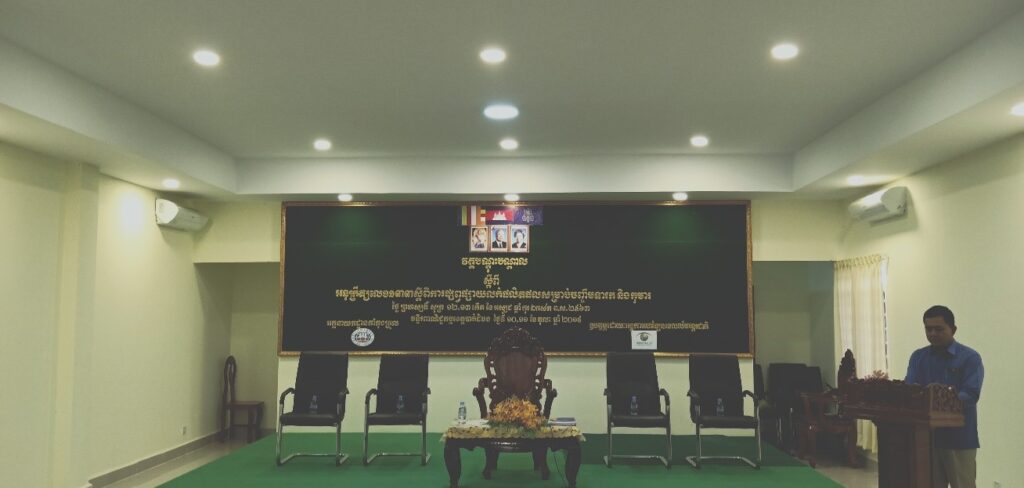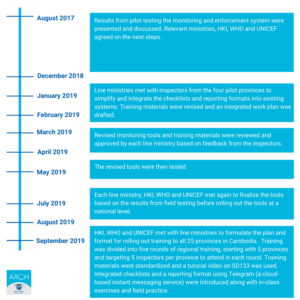Background
In 2005, the Cambodian government adopted many provisions of the International Code of Marketing of Breast-milk Substitutes as national policy. This Sub-Decree on Marketing of Products for Infant and Young Child Feeding (Sub-Decree 133) supports breastfeeding by restricting the promotion of breast-milk substitutes marketed for children less than 2 years of age, unless approved by the Ministry of Health. In 2007, the subsequent Joint Proclamation (Prakas) 061 on the Marketing of Products for Infant and Young Child Feeding was intended to operationalize Sub-Decree 133.
A multisectoral Oversight Board composed of a Control Committee and an Executive Working Group (EWG) was created in 2014 to improve the monitoring and enforcement of Sub-Decree 133. In 2015, the Oversight Board emphasized the need to integrate monitoring activities into the existing work routine of the four ministries responsible for Sub-Decree 133 implementation in order to reduce the need for extra resources and increase sustainability. To help national and subnational officers monitor, checklists from the Network for Global Monitoring and Support for Implementation of the International Code of Marketing of Breast-milk Substitutes and subsequent relevant World Health Assembly Resolutions (NetCode) were adapted to align with Sub-Decree 133 and Joint Proclamation 061. Cambodia is the first country to pilot a monitoring system using adapted versions of NetCode’s monitoring tools.
HKI partners with WHO, UNICEF, and the Cambodian government to pilot implementation of a monitoring and enforcement system
From January to August 2017, the government, with support from Helen Keller International (HKI), WHO, and UNICEF, conducted a study to test the newly developed Sub-Decree 133 monitoring and enforcement system and identify the changes required to improve the system. The pilot revealed that modifications were needed. Recommendations included: 1) integrate monitor trainings into existing ministry training curricula; 2) improve identification of appropriate monitors for Sub-Decree training; 3) delineate clear roles and responsibilities for the national and subnational level officers; 4) simplify monitoring checklists and violation reports; and 5) improve integration of monitoring activities into routine ministry operations.
Ministries revise tools and protocols and prepare for Sub-Decree 133 training
Progress made
The roll-out of training for Sub-Decree 133 monitoring in Cambodia has begun. CAMCONTROL conducted the first-round of regional training in Battambang Province on October 10-11, 2019. Inspectors from five provinces (Banteay Meanchey, Oddar Meanchey, Pailin, Siem Reap and Pursat) were trained using a participatory-centered approach. These inspectors also integrated monitoring into their existing workplans and included briefings at monthly and annual meetings for their provincial branch. Based on evaluations, the training has increased inspectors’ practical knowledge of how to monitor Sub-Decree 133.
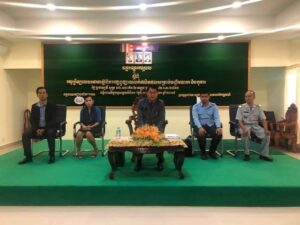
After the first-round training of Sub-Decree 133, CAMCONTROL’s provincial branch inspectors of Banteay Meanchey, Oddar Meanchey, Pursat, and Pailin conducted breast-milk substitutes (BMS) monitoring at shops and supermarkets as part of the integrated routine monitoring activities. The inspectors educated shop owners on how to comply with Sub-Decree 133 while also reporting the violations to the Executive Working Group (EWG) to take action against BMS companies.
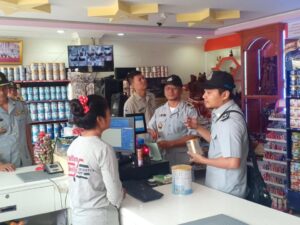
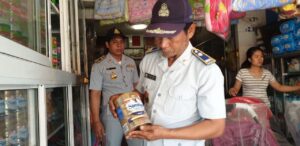
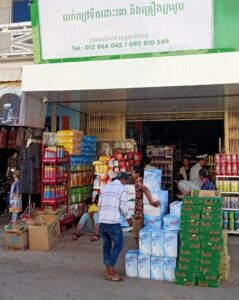
Some challenges were discussed during the training. Breast-milk substitutes for children 24-36 months of age do not fall under the scope of Sub-Decree 133, giving businesses the opportunity to cross-promote products to younger children. The issue of smuggled breast-milk substitutes also remains problematic since it is unclear how to take action against promotion of these. The EWG and relevant stakeholders will consider these and other issues as they move forward with efforts to monitor and enforce Sub-Decree 133 and promote optimal infant and young child feeding in Cambodia.


